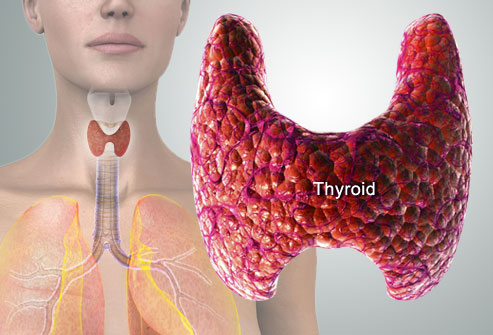The thyroid gland needs iodine to function properly. And although most of us get the iodine we need from iodized salt, it is important to know the exact signs of thyroid disorders. Thyroid disorders occur more commonly in women and usually involve either an overactive or underactive gland.

Here are some of the subtle signs of thyroid problems. The thyroid gland makes hormones that affect nearly every function of the body. These hormones regulate metabolism, physical and mental development, nerve and muscle function, and blood circulation, as well as the action of other hormones, such as insulin. Although thyroid disease is no longer as common as it used to be, it is important to recognize the early signs of a possible thyroid problem.
Common symptoms include:
Swelling in the lower neck
A goiter is a swelling in the lower neck that is known as an enlarged thyroid gland. The gland is butterfly-shaped at the front of the throat, and any disorder can occur if the thyroid gland is producing too much thyroid hormone or not producing enough.
Difficulty swallowing
Early symptoms of thyroid dysfunction are associated with an enlarged gland and include discomfort or tightness in the throat, difficulty swallowing, cough, and a hoarse voice.
Fatigue
Symptoms such as excessive fatigue, weight gain or loss and difficulty concentrating are other signs that the thyroid gland may not be working as well as it should. Although there are some overlaps, symptoms of one disorder mirror symptoms of the other. Insomnia and frequent waking during the night are common symptoms of an overactive thyroid gland, which increases feelings of fatigue.
Feeling nervous and nervous
Symptoms of hyperthyroidism, referred to as hyperthyroidism or Graves’ disease, are associated with a speeding up of the metabolism. When the metabolism speeds up, too much thyroid hormone is produced. This can cause the heartbeat to speed up, causing you to feel anxious, stressed, and also have trouble concentrating.

Weight loss and extreme hunger
With increased metabolism, those with hyperthyroidism find themselves losing weight even though they feel hungry and eat more. . Irregular menstrual periods: Excessive thyroid hormone production can lead to short, spaced and very light menstrual periods.
Changes in bowel habits
An overactive thyroid gland can lead to frequent bowel movements or diarrhea.
Prominent eyes
Whether or not a goiter distorts the neck, a person with hyperthyroidism develops protruding eyes.
Treatment for hyperthyroidism aims to reduce hormone production, which can include anti-thyroid medication or surgery to remove all or parts of the thyroid gland. Symptoms of hypothyroidism or hypothyroidism can easily go unnoticed and are caused by a slowing of the metabolism.





![The Top & Most Popular Seafood Bucket Restaurants in Dubai for you [Never Miss]](https://uae24x7.com/wp-content/uploads/2020/09/8-seafood-in-a-bucket-scaled-e1600739237403.jpg)
![Procedures for Renewing the Driving License in Abu Dhabi [3 Simple Steps]](https://uae24x7.com/wp-content/uploads/2020/07/Capture-9-e1595666454466.jpg)





